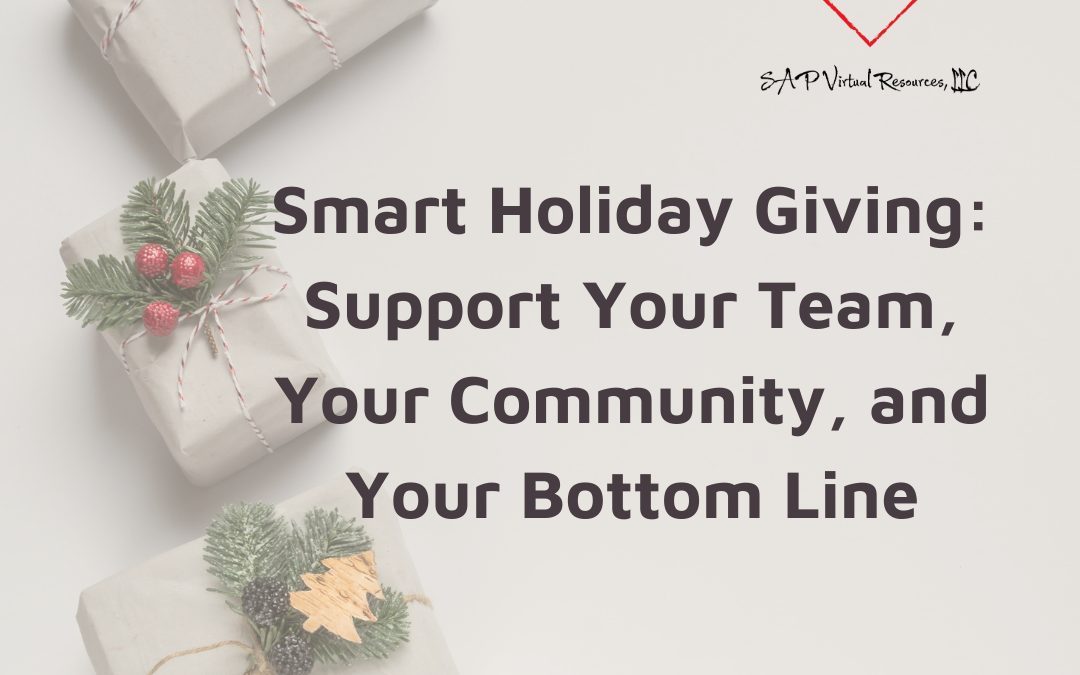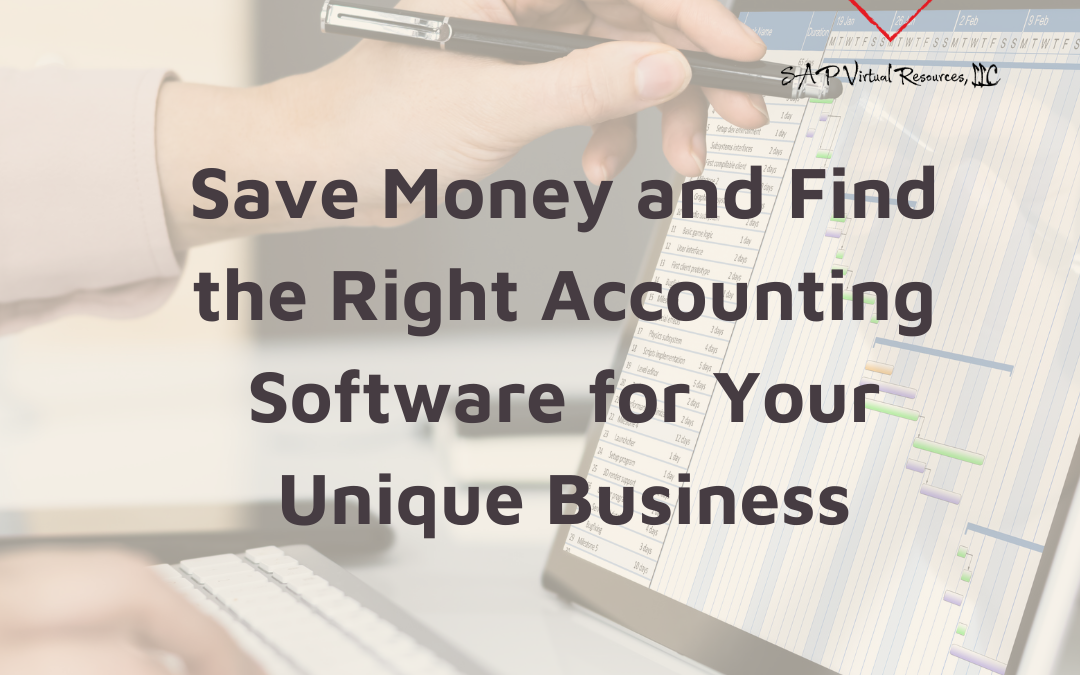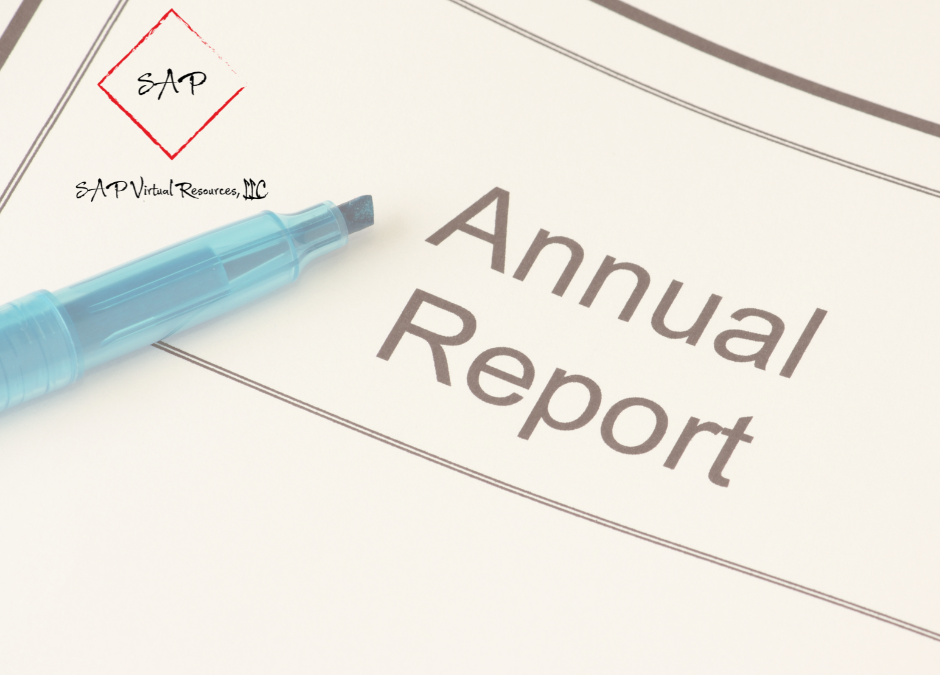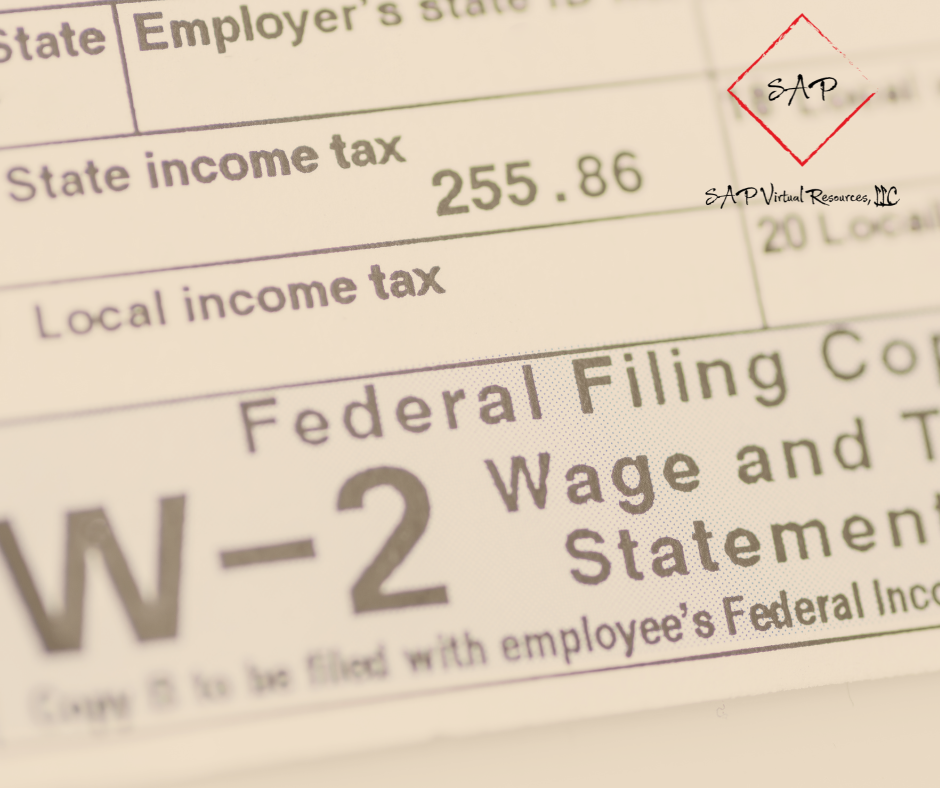
by Sarah | Nov 15, 2024 | Business Tools
Now is when many business owners think about holiday giving to their team and community. A thoughtful approach to generosity can bring warmth and happiness to your business, employees, and the local community.
There are three areas to consider: charitable donations, employee gifts, and community partnerships.
Creating Positive Change Through Charitable Giving
We naturally feel good about supporting a charitable cause that is dear to us. There is also a strategic side for business owners who approach holiday giving thoughtfully. Consider the following:
Select Tax-Deductible Organizations
Some contributions are tax-deductible when donating to an organization with a 501(c)(3) status. Maintain records or receipts of the donation for accounting and tax documentation.
Align Contributions with Company Values
Selecting causes that resonate with your mission will add depth to your brand. When a company supports local schools, health and environmental initiatives, it strengthens its reputation and fosters a sense of unity and shared mission among its employees.
Set a Budget
A dedicated budget for charitable giving ensures donations are organized and manageable. Consider designating a percentage of your annual revenue to stay within budget.
Employee Appreciation Without Tax Complications
Appreciation for your employees shouldn’t be limited to the holidays. Holiday giving can boost the morale of your team. Here is how to manage holiday gifting effectively:
Understand what is taxable and non-taxable to employees.
Generally, cash bonuses, gift cards, and large-value gifts are taxable income for employees. However, some benefits may not be taxable.
Think beyond material gifts.
Consider giving a benefit that offers value throughout the year. Wellness incentives or professional development opportunities are practical and may be non-taxable.
Stay on top of compliance.
When you gift your employees, be careful not to choose something that may be taxable. Your gift should benefit them, and you also need to be sure it meets your budget constraints.
Foster Community Partnerships
Local businesses welcome the support of their community, especially during the holiday season. Your support of local businesses helps the communities’ economy and creates valuable connections. It also benefits your business with increased visibility and a positive reputation.
Partnerships with Local Vendors
By using local vendors for holiday events or gifts, you can strengthen community ties and your commitment to supporting small businesses. This is a win-win for the employees and your regional partners.
Carefully Track Expenses
As with everything in your business, expense tracking is essential. If your expenses directly serve your business, they can often be categorized as marketing expenses and may be tax-deductible. Examples of partnerships might include hosting a holiday market or community event.
Encourage Employees to Shop Locally
Offering discounts to local vendors and shops is a simple and effective way to help your employees and the community.
Think about how your holiday giving can genuinely matter to your employees and the local community. You can remain financially savvy while supporting charities and strengthening community bonds.
Before making a final decision on holiday gifting, be sure to consult with your tax accountant.
Have you decided to hire a bookkeeper as part of your business’ New Year’s Resolution? Schedule a call, and let’s chat to determine your needs.

by Sarah | Oct 14, 2024 | Business Tools
Finding the right financial tools for your unique business can be overwhelming. With so many options available, trying the latest flashy accounting software or payroll system can be tempting. However, making the right decisions for your specific needs is crucial to keeping accurate records and ensuring financial stability.
I rely on proven software for day-to-day accounting functions that I’ve found most effective across various businesses. The software must be flexible enough to manage your financials efficiently, giving you confidence that you’re in good hands.
The Pitfalls of Adopting New Tools without a Strategy
I’ve seen businesses purchase software or systems simply because they’re trendy. Shiny object syndrome is real! However, it’s important to remember that the latest trend isn’t always the best fit for your business. Unfortunately, this can lead to several challenges, especially if it does not align with the core accounting platform you’re already using.
- Wasted Investments: It’s easy to overinvest in solutions that don’t suit your business.
- Lost Productivity: Learning and integrating new systems takes time from other tasks.
- Missed Opportunity: Implementing new systems consumes valuable resources.
Why One Size Doesn’t Fit All
Every business has distinct financial goals and needs. Some may need expense tracking, inventory management, project-based accounting, or mobile accessibility. Choosing payroll and accounting software that aligns with your goals and needs while staying within budget is essential. The right software can meet your current needs and work for your future growth.
- Streamlined Processes: Your software must efficiently handle daily tasks.
- Different Needs: Every business has specific goals that require different solutions.
- Cost-Effective Solutions: Use software that offers value for your unique business.
Finding the Right System for Your Unique Business
Choosing suitable financial systems isn’t just about finding the newest tool. It’s about making informed decisions that will help you stay organized and save money. Evaluate your needs and find solutions that integrate with your existing accounting software while offering the flexibility you need for payroll management.
Here are some of the factors I consider when recommending options:
- Growth Stages: Find a system that can grow as your business grows.
- Compliance and Tax Filing: Your systems should maintain complete and accurate records.
- Ease of Integration: Data should flow accurately between systems, giving you a clear financial picture.
Choosing the right financial solutions for your unique business isn’t about chasing the latest trends—it’s about selecting tools that work for you and your specific needs. The accounting software I recommend for daily operations is reliable, efficient, and secure, providing a foundation for financial management. Payroll services should grow with your business, giving you the security and stability you need.
Find a trusted advisor to help you choose the right software programs. An advisor will help you avoid costly mistakes and ensure that the systems you use integrate perfectly to meet your accounting needs. With the right guidance, you can focus on the activities to grow your business with confidence and peace of mind.
I’m ready to help you with your bookkeeping needs. Let’s connect.
Schedule a call, and let’s chat.

by Sarah | Sep 13, 2024 | Bookkeeping Basics
Filing an annual report with your Secretary of State is a straightforward task. Your business must file many reports, including income and payroll taxes, as well as federal and state taxes. However, an annual report is often overlooked.
Many states require filing an annual report with the Secretary of State. Although it may seem like a minor administrative task, not filing can have significant consequences.
What is an Annual Report?
In most states, the Secretary of State requires filing an annual report. The information required provides up-to-date information about your company. It is the state’s way of ensuring you are still operating and legally maintaining everything.
Why does this matter? Keeping the state informed about your business’s status helps you stay in good graces. Filing your annual report on time is a great start.
Timing is Everything
When it comes to filing deadlines, every state has its own rules. Some states require the report to be filed on the anniversary of your business’s formation, while others have a set date every year. Missing the deadline can cost you. It’s essential to know your state’s filing schedule. Check your Secretary of State’s website. You can find a list of all states in this report.
What Happens if You Don’t File?
I get it—life happens. The annual report deadline might slip through the cracks. But missing the filing date can lead to more than just a slap on the wrist:
Consider this the state’s way of reminding you to file with a price tag attached. Late fees are an unnecessary expense you could easily avoid.
Securing loans, permits, or contracts may be challenging when one loses one’s good standing with the state, significantly hindering growth.
- Dissolution of Your Business
In extreme cases, the state can dissolve your business without your knowledge. Imagine discovering that your company no longer exists. Reinstating a dissolved business is a long, frustrating, and expensive process. It’s much easier to stay compliant from the get-go.
The Benefits of Staying Up-to-Date
Here is the positive side of being proactive with your annual report filing:
Depending on your state, filing your annual report may be non-negotiable. Staying compliant means your business can continue to operate without any legal hiccups.
- Avoid Unnecessary Penalties
Why pay more than you have to? Filing on time keeps extra fees at bay and saves your hard-earned money for where it matters—growing your business.
You can continue business as usual when your business is in good standing. You’ll have no problem applying for loans, renewing permits, or working with contractors. Plus, you won’t have to worry about sudden legal barriers.
Keeping up with your filings lets you focus on your best work without worrying that something’s fallen through the cracks.
How to Make Filing Your Annual Report Easy
With some planning, you can make filing your annual report a seamless part of your yearly routine. It’s a straightforward process that, when done right, can give you peace of mind for the rest of the year.
Implement a system to remind you well before the deadline, whether with a calendar, a project management tool, or even good old-fashioned Post-it notes.
Each state has different filing dates, so mark your calendar! To avoid any last-minute surprises, verify the due date for your annual report on your Secretary of State’s website.
Throughout the year, make sure your business records (addresses, officers, etc.) are current. This will make filing your report a breeze when the time comes.
If you need clarification on filing the report, consider hiring a professional. Having the reassurance that it is correct can relieve stress.
A Little Effort Goes a Long Way
As a business owner, you must comply with your annual report filing. It’s a small task with significant consequences if overlooked. You can stay compliant by being proactive, staying organized, and leveraging professional help when needed. So, stay informed, file on time, and focus on growing your business.
If you need help filing your annual report, please don’t hesitate to contact me. I’m here to assist you in this essential task. Schedule a call to learn more.

by Sarah | Aug 15, 2024 | Payroll
Do you dread making quarterly tax payments and filing your reports when tax o’clock strikes? Although having employees is necessary, quarterly reports can be tedious. Making timely payroll tax payments and report filing will keep you compliant with the IRS and allow you to avoid penalties. This is a habit worth building for your peace of mind.
Who pays quarterly tax payments?
Employers pay quarterly taxes on their employees’ payroll.
Quarterly payroll taxes include:
- State Income Tax (if applicable)
- Workers’ Compensation Tax
- Federal Unemployment Tax
- State Unemployment Tax
Self-employed business owners are required to pay quarterly estimated tax payments.
Self-employment covers:
- An independent contractor
- A sole proprietor
- A member of a partnership
- A person who runs a business as your own (even if only part-time)
Self-employed individuals must pay these two taxes:
- Self-employment tax (Social Security and Medicare)
- Income tax on the profits of your business and any other income.
Quarterly payments are not the same as W-2 and 1099 filings. W-2 and 1099 forms report wages and other income paid to employees and contractors, while quarterly tax payments are the tax payments you make to the IRS and state tax authorities.
Why do I need to make quarterly tax payments?
Timely quarterly payments allow you to be:
- Compliant with the IRS: Ensuring you pay your payroll and federal estimated taxes every quarter keeps you in good standing with the IRS and avoids legal complications.
- Prevent Penalties and Interest: Late payments can result in significant fines that quickly add up and strain your business’s finances.
- Improve Cash Flow Management: Regularly paying taxes ensures you have enough money for your tax obligations, improving your cash flow management.
- Maintain Financial Stability: Timely tax payments are about compliance and contributing to your business’s financial stability.
Filing Deadlines:
- Payroll Taxes: Payroll tax payments and reports are due by the end of the month following the end of each quarter (April 30th, July 31st, October 31st, and January 31st). The Federal Unemployment Tax should be paid online at EFTPS. On this site, you pay your Federal Withholding Taxes, Social Security Taxes, and Medicare Taxes after each payroll is run. If your Federal Unemployment Tax is less than $500 a year, it will only be due annually. You will need to file your quarterly 941 along with a Schedule B if you pay semi-weekly, and this will cover your Federal Withholding Tax, Social Security Tax, and Medicare Tax. Because you have been paying these taxes with each payroll, this report will tie the wages to the taxes paid for the quarter.
- Federal Estimated Taxes: Estimated taxes are due by the 15th of April, June, September, and January of the following year.
What are the penalties if a filing is late?
Penalties for late payment or underpayment:
- Payroll Taxes: Penalties vary but can be as high as 15% of the unpaid tax plus interest.
- Federal Estimated Taxes: Penalties vary for underpayment of estimated tax. The penalty starts at 0.5% of the unpaid tax amount per month, with a maximum penalty of up to 25%.
Benefits of Timely Payments:
- Prevent Legal Issues: Meeting your tax obligations on time helps avoid legal issues with the IRS.
- Eliminate Chaos: Regular tax payments prevent the chaos and stress of last-minute filings.
- Reliable Budgeting: Tracking your tax deadlines and amounts helps you budget better and manage your finances throughout the year.
- Reputation Management: Maintaining good standing with the IRS enhances your business’s credibility with clients, customers, and employees.
How can you stay compliant?
Practical tips for consistent Quarterly Tax payments and reports:
- Automate Reminders: Use a calendar or automated reminders to ensure you never miss a deadline.
- Tax Savings Account: Save a portion of your monthly income in a dedicated account to cover your tax payments.
- Professional Guidance: Consult a tax professional for expert guidance to ensure you maximize deductions and credits. They can also help you determine what should be paid in your quarterly estimated taxes.
- Educate Yourself: Keep up-to-date with tax regulations and changes to avoid surprises and ensure compliance, giving you peace of mind.
Consistency in filing quarterly payroll and federal estimated taxes allows you to stay legally compliant and maintain your business’s financial health. With some organization and planning, you will quickly finish this task and get back to growing your business.
Does Tax O’Clock steal your peace of mind? I can help you get your books in order. Schedule a call to learn more.

by Sarah | Jul 12, 2024 | Payroll
Whether you hire employees or freelancers for your business, you must file W-2s and 1099s regularly. It may not be an exciting topic, but it is crucial to your bottom line. Missing deadlines or filing incorrect forms can lead to hefty penalties.
Doing payroll is the adult equivalent of a high school math class – you know it’s important but tedious. You start enthusiastically, thinking it’s a quick job, but distractions arise and fires need to be put out. only to be distracted by putting out fires in your business. In the end, organizing the supply closet sounds like an exciting adventure compared to deciphering payroll forms!
The clients I work with file W-2s, 1099-NECs, or 1099-MISCs. Each form has a different purpose and covers various types of payments.
W-2 (Wage and Tax Statement)
This form reports wages paid to employees and the taxes withheld from those wages during the calendar year.
Must be issued for all employees who have been paid a salary, wage, or other form of compensation.
Used to report:
- Gross wages, salaries, and tips.
- Federal income tax withheld.
- Social Security tax withheld.
- Medicare tax withheld.
- State and local income tax withheld.
- Employee contributions to retirement plans.
This form must be provided to the employee by January 31st.
It must be filed with the Social Security Administration by January 31st, either electronically or on paper.
1099-NEC (Nonemployee Compensation)
The IRS re-implemented this form in 2020, which hadn’t been used since the 1980s. I discussed this form in more depth in a previous blog post.
This form reports payments made to non-employees, such as independent contractors, freelancers, and self-employed individuals, for services performed.
Must be filed for a nonemployee who received payments of $600 or more in a calendar year.
They are used for payments for services performed and commissions, fees, prizes, awards, or other compensation for services.
Must be filed with the IRS and provided to the recipient by January 31st.
1099-MISC (Miscellaneous Income)
On this form, you report income other than wages, salaries, and tips that you report on your W-2 form.
Must be filed to report payments of $600 or more in a calendar year for most types of payments. However, different thresholds apply for certain payments. (Example: Report royalties of $10 or more.)
Common uses:
- Rent payments
- Royalties
- Prizes and awards that are not for services performed
- Payments to Attorneys
- Other income payments
- Medical and healthcare payments
- Crop insurance proceeds
- Payments for fishing boat proceeds
- Section 409A deferrals
This form must be provided to the recipient by January 31st. If filed electronically, the filing deadline to the IRS is March 31st, and the filing deadline for paper filing is February 28th.
Penalties: Yikes!
Missing deadlines for W-2s and 1099s can be costly. The penalties range from $50 to $270 per form, depending on how late you file.
In order to avoid penalties, start with accuracy. Double-check critical details like Social Security numbers, addresses, and income amounts. Cross-reference your payroll records with the forms before filing to ensure everything matches up.
Online Filing: Get Tech-Savvy
If you’re filing more than ten forms, it’s time to embrace technology. Register with the IRS’s Information Returns Intake System (IRIS) for streamlined electronic filing. Remember, you can’t just print forms from the IRS website as they require special ink and paper.
Common Mistakes to Avoid
- Incorrect Information: Ensure all data, especially Social Security numbers and income amounts, are correct.
- Missing Deadlines: Mark your calendar and set reminders to meet all filing deadlines.
- Inadequate Records: Keep thorough payroll records to back up the information on your forms.
- Failure to Register for E-Filing: Register with the IRS for electronic filing if required.
Helpful Resources
- IRS Website: For the latest updates and detailed filing instructions, visit irs.gov.
- Social Security Administration: For W-2 filing guidelines, check out the SSA’s employer page.
Knowing the deadlines, understanding penalties, and embracing electronic filing rules can make handling W-2s and 1099s easier. Stay organized, focused, and proactive to keep your business tax-compliant and stress-free.
Let’s be honest – you didn’t start your business to get buried in bookkeeping and payroll paperwork, right? Let’s chat if managing your bookkeeping feels like trying to herd cats! Schedule a consultation call with me, and we’ll explore how to work together.





